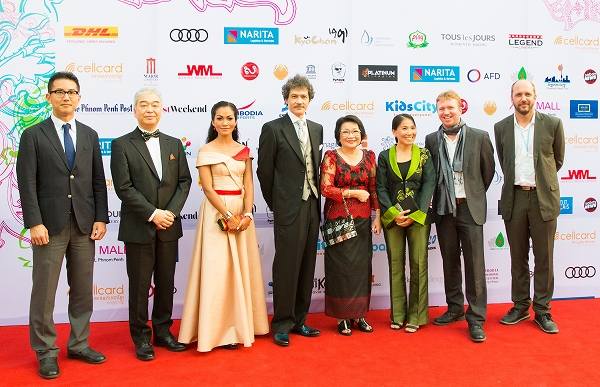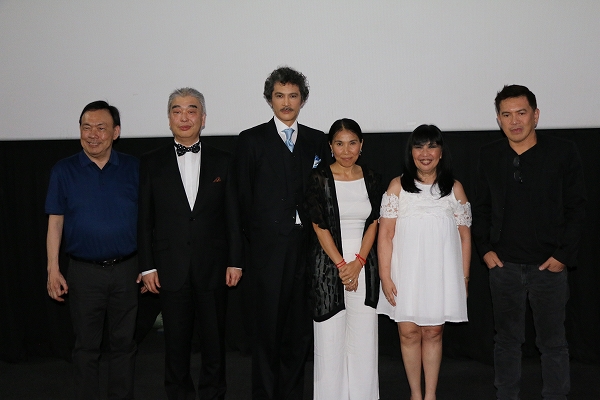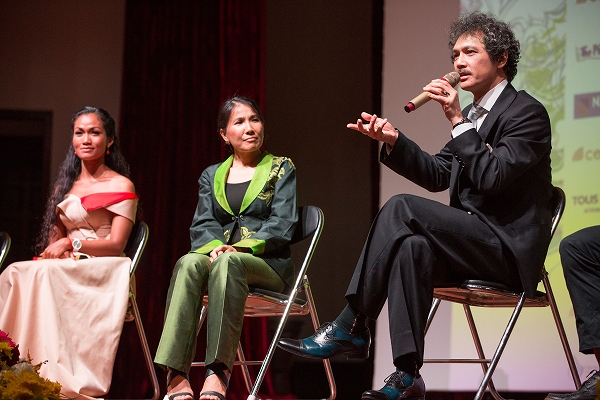The omnibus film Asian Three-Fold Mirror 2016: Reflections, co-produced by Tokyo International Film Festival (TIFF) and the Japan Foundation Asian Center, had its Cambodian and Philippine premieres in early March. Also appearing were several directors and actors featured in the film, as well as Kenji Ishizaka, the TIFF Asian Future programming director.
The film was screened as the international premiere as well as Special Gala at the Cambodia International Film Festival on March 8 in Phnom Penh, and as the opening film of the Sinag Maynila Film Festival on March 9 in Manila, Philippines. Directors and actors participated in the Q&A sessions following the screenings, and were greeted by warm applause from the audiences of a few hundred people.

Cambodia International Film Festival, March 8, 2017
The Asian Three-Fold Mirror project was launched in 2014 as part of the collaboration between the Japan Foundation Asia Center and TIFF. The project aims to deepen interactions between neighboring countries within Asia, as well as to enrich cultural understanding and provide a chance for people to consider their identities and ways of life as individuals in Asia.

Sinag Maynila Film Festival, March 9, 2017
The directors selected for the second edition of the project, which is planned to be premiered in 2018, will be announced at the 30th TIFF, to be held from October 25 – November 3, 2017, at Roppongi Hills and other venues in Tokyo.
Notes and Quotes from the Q&A sessions
(Cambodia International Film Festival, March 8, 2017 & Sinag Maynila Film Festival, March 9, 2017)
Sotho Kulikar (Cambodia; Director of
Beyond the Bridge)
The reason that I chose the story about Khmer Rouge was that I always heard about the Khmer Rouge from the old generation but they never tell us about this story in detail. Every time they talked about this it reminded them about pain in the past. So the story has never been told properly. To make the young generation understand about what happened to our country and the people at that time, through film is the best way to calm people to sit and see what was happening. I also want to share the history with the young generation to understand their own history and not to be a shame to be Khmer.
Masaya Kato (Japan; Actor,
Beyond the Bridge)
When I received this script for the first time, I didn’t know the Japanese bridge in Cambodia. So I was so impressed and really wanted to play the character because I could get opportunity to learn the history between Japan and Cambodia. Also this was the first time to work with Cambodian movie crews so it was a good opportunity to learn Cambodian culture and people for me. So I really enjoyed and learned a lot from this movie.
 Chumvan Sodhachivy
Chumvan Sodhachivy (Cambodia; Actress,
Beyond the Bridge)
The reason I decided to play in the love scene is that I trusted the director and also Mr. Kato advised me how to do it smoothly. So I got confidence to play this role and I thought I am not myself but I am Mealea from the story. Of course, I felt so nervous.
Omnibus Film Production: Asian Three-Fold Mirror
The Asian Three-Fold Mirror is a collaborative film series between
the Japan Foundation Asia Center and the Tokyo International Film Festival, bringing together three accomplished directors from Asian countries, including Japan. Just like a three-fold mirror, the omnibus films will reflect society and culture in today’s Asia from three different angles, highlighting each director’s unique vision.
The Japan Foundation Asia Center jfac.jp
The Japan Foundation is Japan’s principal independent administrative institution dedicated to carrying out cultural exchange initiatives throughout the world.
The Asia Center, established in April 2014, is a division within the Foundation that conducts and supports collaborative initiatives with its Asian—primarily ASEAN—counterparts. Through interacting and working together in Japanese-language education, arts and culture, sports, and grassroots and intellectual exchange, the Asia Center pursues to develop the sense of kinship and coexistence as neighboring inhabitants of Asia.


